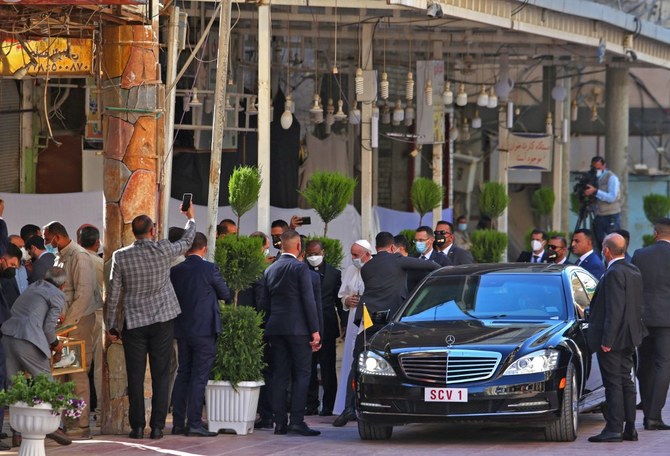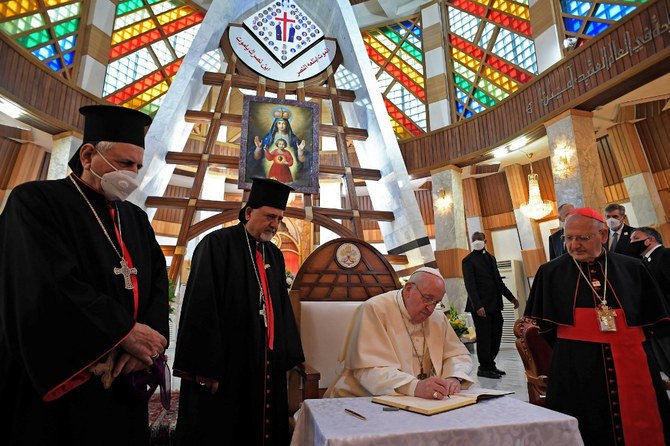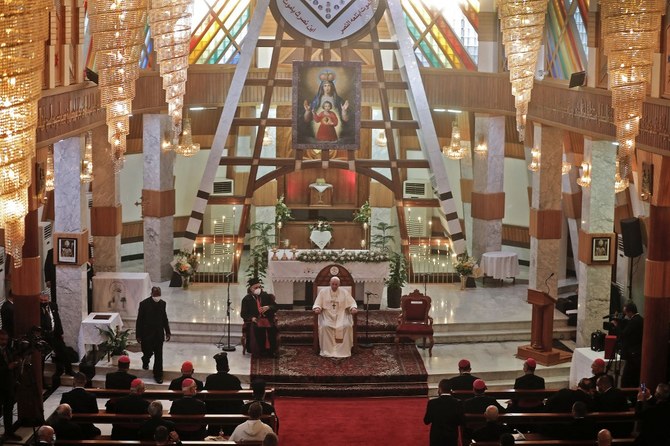DUBAI: Pope Francis and Iraq’s top Shiite cleric delivered a powerful message of peaceful coexistence on Saturday in a historic first meeting between the leaders of Roman Catholicism and Shiite Islam.
The Shiite cleric, Ali Al-Sistani, met the Pope at his home in Najaf, the seat of the Iraqi Shiite clergy, on the second day of the pontiff’s historic tour of Iraq.
Pope Francis arrived in Iraq on Friday and made a speech in which he called for an end to extremism, violence and corruption.
The head of the Catholic church began the first-ever papal trip to the country by meeting government officials in Baghdad, before traveling to a church where Christians were massacred by militants in 2010.
His visit comes as Iraq attempts to claw its way to stability after years of sectarian conflict, the Daesh occupation, chronic corruption, and widespread anger at government officials for failing to provide basic services.
At Our Lady of Salvation church, he paid tribute to the 58 people who were killed in an extremist attack in 2010, one of the deadliest targeting Christians.
Follow live coverage of his second day itinerary below (All times GMT)
17:00 - With the mass finished, that concludes the Pope's public engagements on the second day of his visit. Remember to check back on arabnews.com for coverage of Sunday's events, the highlight of which will be a meeting with the president and the prime minister of the autonomous region of Kurdistan in Erbil.
Pope Francis will also visit and make a speech at the Church of the Immaculate Conception in Qaraqosh and deliver a mass at the Franso Hariri Stadium in Erbil.
15:00 - Now, the Pope delivers a mass at the Chaldean Catheral of Saint Joseph. Watch it live below...
14:30 - Dr. Dania Koleilat Khatib wrote about how the visit of Pope Francis begins a new chapter not only for Christians in Iraq but for all Eastern Christians. Read her opinion piece below.
Opinion
This section contains relevant reference points, placed in (Opinion field)
14:00: In case you missed some of the fantastic images from the first day of the Pope's visit, you can check out our gallery here...

13:00 - ICYMI: Lebanese President Michel Aoun welcomed the pope’s arrival in Iraq on Friday, saying he hoped it would be a “push toward establishing the genuine peace” that people in the region needed. To read more, click here.

09:34: Pope Francis is set to return Baghdad after attending an interfaith meeting at the ruins of Ur in southern Iraq, the traditional birthplace of the Prophet Abraham, father of Muslim and Christian faiths.

Above, a general view of the ancient archeological site of Ur, traditionally believed to be the birthplace of Abraham, in Ur near Nassiriya, Iraq. Iraqiya TV/Reuters TV via Reuters
09:08: Pope Francis is urging Iraq’s Muslim and Christian religious leaders to put aside animosities and work together for peace and unity during an interfaith meeting in the traditional birthplace of the Prophet Abraham, father of their faiths.
He told the gathering: “This is true religiosity: to worship God and to love our neighbor.”
Francis traveled to the ruins of Ur in southern Iraq on Saturday to reinforce his message of interreligious tolerance and fraternity during the first-ever papal visit to Iraq, a country riven by religious and ethnic divisions.

Pope Francis said that he prays for ‘peace, unity’ in the Middle East ‘especially Syria’ during the interreligious meeting. (AFP)
Francis told the faith leaders that it was fitting that they come together in Ur, “back to our origins, to the sources of God’s work, to the birth of our religions” to pray together for peace as children of Abraham, the prophet common to Muslims, Christians and Jews.
He said: “From this place, where faith was born, from the land of our father Abraham, let us affirm that God is merciful and that the greatest blasphemy is to profane his name by hating our brothers and sisters. Hostility, extremism and violence are not born of a religious heart: they are betrayals of religion.”
He said there could never be peace as long as Iraqis viewed people of different faiths as the “other.”
He said: “Peace does not demand winners or losers, but rather brothers and sisters who, for all the misunderstandings and hurts of the past, are journeying from conflict to unity.”
08:05: Pope Francis attends an interreligious meeting at the Plain of Ur during day two of his apostolic tour of Iraq.
#LIVE: #PopeFrancis @pontifex attends inter religious meeting at the Plain of Ur during day 2 of #PopeinIraq tourhttps://t.co/zUNeo6QReM
— Arab News (@arabnews) March 6, 2021
The meeting takes place in the shadow of Ur’s magnificent ziggurat, the 6,000-year-old archaeological complex near Nasiriyah in southern Iraq.

Pope Francis attends an interreligious meeting at the archaeological site of Ur near Nasiriyah, southern Iraq on March 6, 2021. (AFP)
07: 28: Top Shiite cleric Ali Al-Sistani has told Pope Francis that Iraq Christians should live in ‘peace’, a statement from his office said.
Al-Sistani ‘affirmed his concern that Christian citizens should live like all Iraqis in peace and security, and with their full constitutional rights,’ the statement office said.
For its part, the Vatican said Francis thanked Al-Sistani and the Shiite people for having “raised his voice in defense of the weakest and most persecuted” during some of the most violent times in Iraq’s recent history.
He said Al-Sistani’s message of peace affirmed “the sacredness of human life and the importance of the unity of the Iraqi people.”

Doves are released to mark Pope Francis’s private meeting Grand Ayatollah Ali Al-Sistani at his home in Najaf. (Vatican Media)
07:00: Pope Francis leaves the home of Grand Ayatollah Ali Al-Sistani in Najaf after meeting with him. He is expected to depart for Nassiriya to lead an interreligious meeting at the Plain of Ur in southern Iraq which is revered as the birthplace of Abraham, father of Judaism, Christianity and Islam. The Pope will afterwards return to Baghdad.
The visit was carried live on Iraqi television, and residents cheered the meeting of two respected faith leaders.
“We welcome the pope’s visit to Iraq and especially to the holy city of Najaf and his meeting with Grand Ayatollah Ali Al-Sistani,” said Najaf resident Haidar Al-Ilyawi. “It is an historic visit and hope it will be good for Iraq and the Iraqi people.”

Pope Francis leaves the home of Grand Ayatollah Ali Al-Sistani in Najaf after meeting with him. (Screenshot)
05:05: Pope Francis arrives in Grand Ayatollah Ali Al-Sistani’s home Najaf.
#LIVE: @pontifex Pope Francis arrives in Najaf for meeting with Grand Ayatollah Sistani #PopeinIraqhttps://t.co/XLvClISI8P
— Arab News (@arabnews) March 6, 2021
The Vatican’s hope was that Francis would sign a document with Al-Sistani pledging human fraternity, just as he did with Sunni Islam’s influential grand imam of Al-Azhar, Ahmed El-Tayeb, based in Egypt.
03:45: Pope Francis departs from Baghdad and will travel by plane to the cities of Najaf and Ur.
- with agencies
READ MORE
Go to Arab News’ dedicated In Focus section on the Pope's visit to Iraq for coverage of the historic trip. Click here.



































